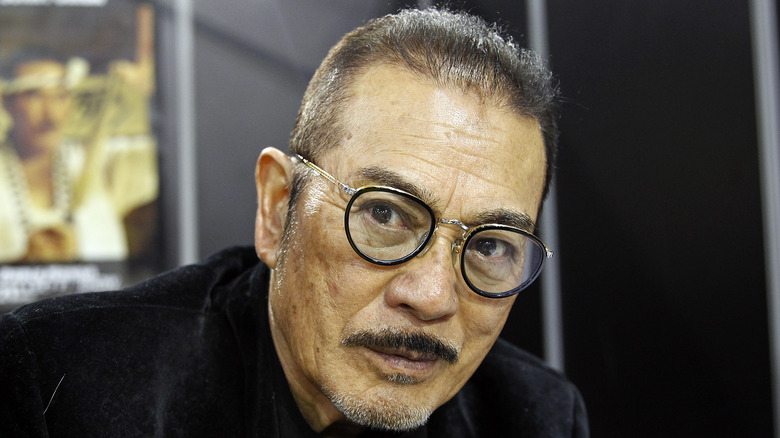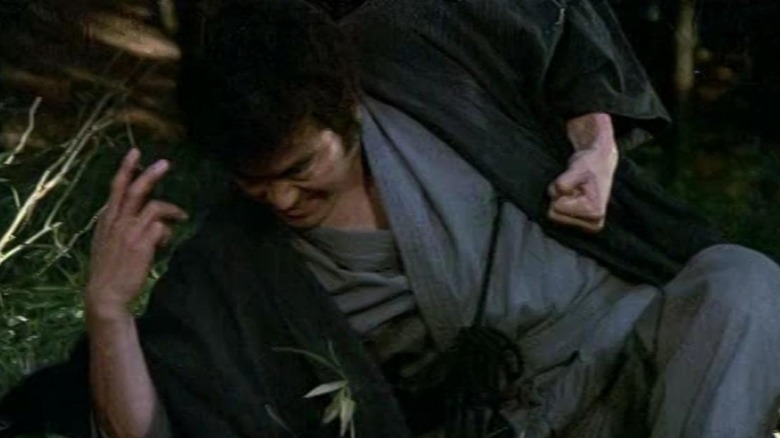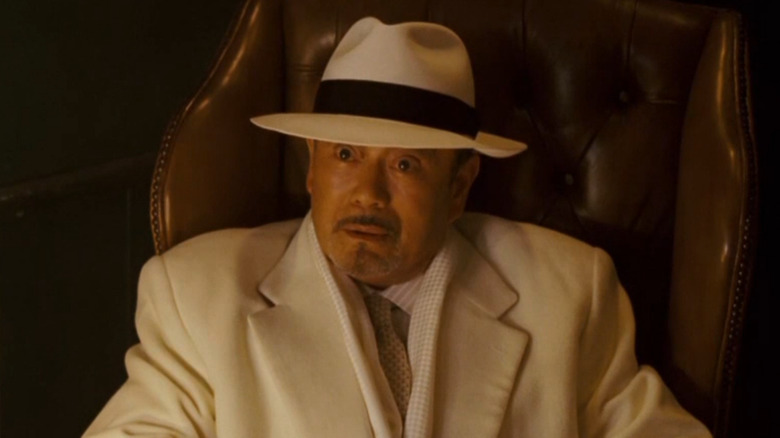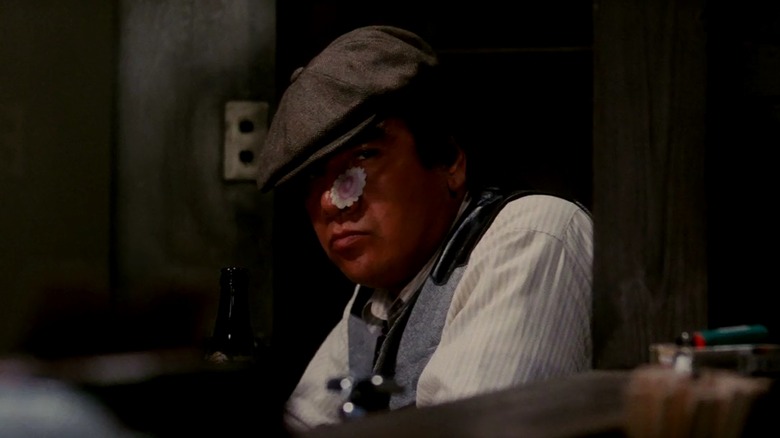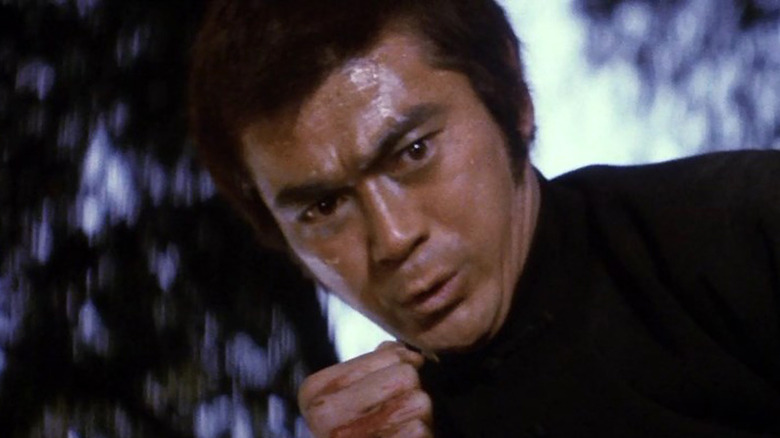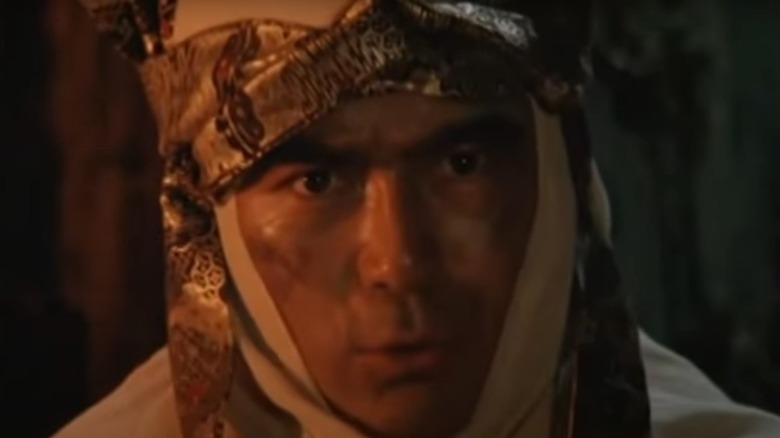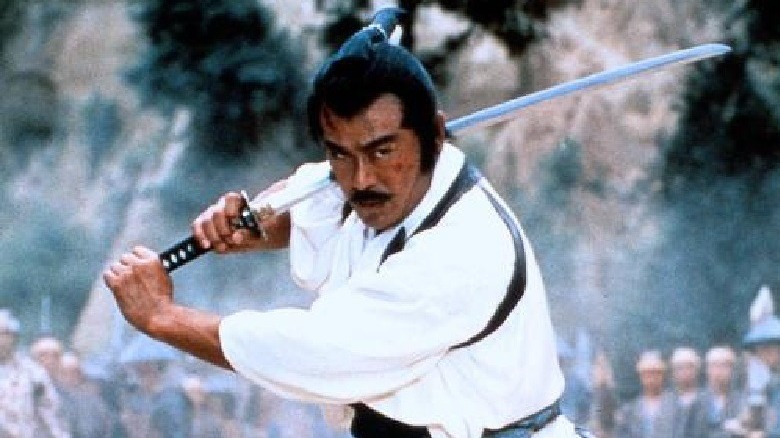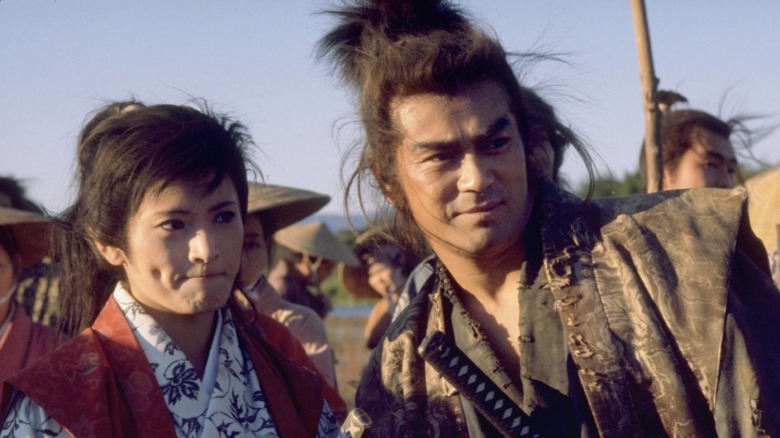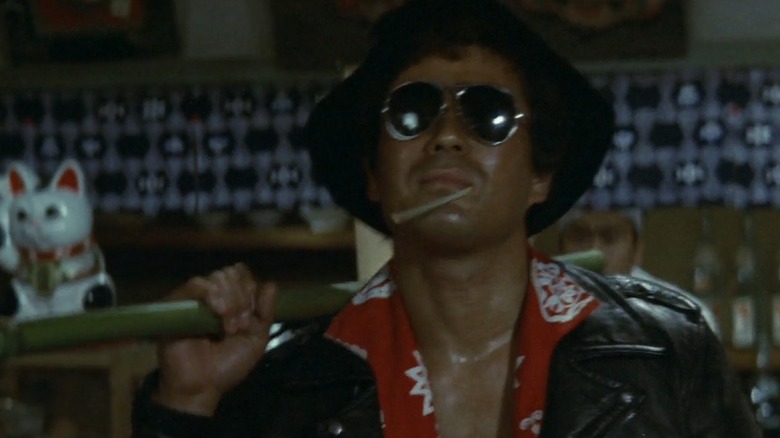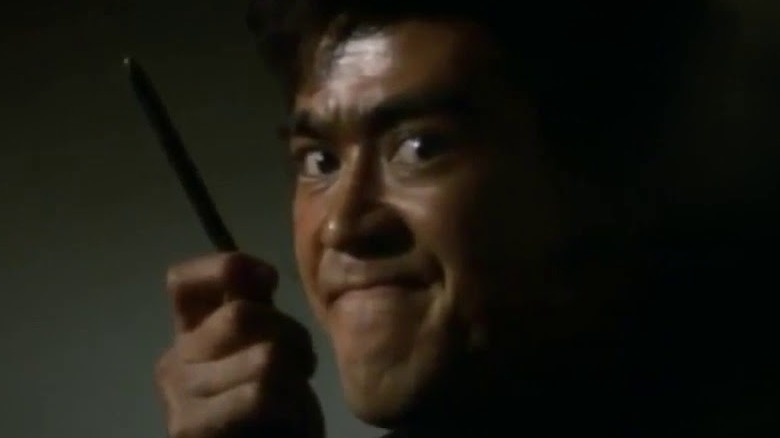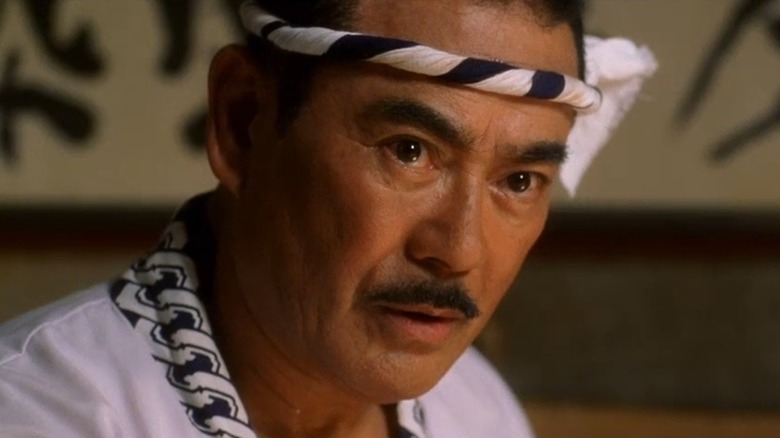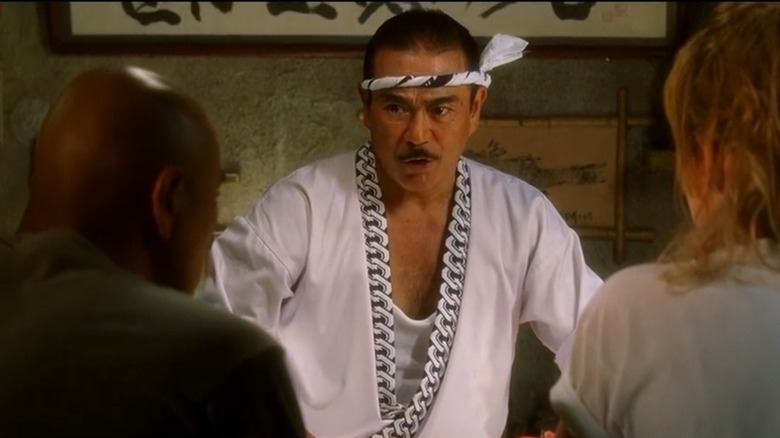The Best Sonny Chiba Films, Ranked
We may receive a commission on purchases made from links.
Shin'ichi "Sonny" Chiba was one of the greatest cinematic martial artists, with a long career that stretched from the 1960s to 2021. He was known for his wide array of black belts as well as over 200 acting credits, including epic roles in martial arts-centric films like "The Street Fighter," "Kill Bill," and others. In addition to his own work, Chiba exerted a massive influence on Japanese martial arts cinema with his founding of the Japan Action Club (a group devoted to training stuntpeople and suit actors in realistic fighting techniques in martial arts cinema) and his undeniable impact on Western cult cinema (like the works of director Quentin Tarantino).
Chiba's influence on global martial arts cinema is especially massive, and some of his films are essential watches for fans of the genre as well as novices. From fantasy epics like "Legend of the Eight Samurai" to classic yakuza films like "Battles Without Honor Or Humanity: Deadly Fight in Hiroshima" to more recent entries like "Kill Bill," his reach was wide, his characters were memorable, and his fists were fierce. Here are the best Sonny Chiba films ranked by Rotten Tomatoes score (generally focusing on the critical consensus where available, and the audience score otherwise).
11. Karate Bearfighter (1975)
"Karate Bearfighter" is the second film in a trilogy based on Ikki Kajiwara's original story. Sonny Chiba plays Masutatsu Oyama, the real-life founder of Kyokushin karate in Japan, for the second time. The film heavily involves the controversy around Oyama's style of karate, a martial arts system very much dedicated to combat effectiveness. In the film, the full-contact style proves too much for the dojo's other fighters, so Oyama instead becomes a bodyguard for old friend-turned-yakuza member Kimura (Hideo Murota). The action-heavy misadventures conclude with Oyama fighting a bear (ergo the translated title), a fitting conclusion to an epic film.
It's a truly legendary and popular appearance for a number of reasons (where else can you see a man in martial arts combat against a bear?), including the fact that Sonny Chiba was one of the more famous students of the real Masutatsu Oyama himself. Chiba plays the role of Oyama throughout the series, beginning in 1975's "Champion of Death" and concluding with 1977's "Karate for Life." Among the wide range of characters Chiba has played in his extensive filmography, his turn as Masutatsu Oyama is easily one of his most memorable.
10. The Fast and the Furious: Tokyo Drift (2006)
"The Fast and the Furious: Tokyo Drift" is the third film in "The Fast and the Furious" franchise. Taking place in Tokyo, the film follows Sean Boswell (Lucas Black) whose street racing puts him on the outs with local police. He goes to live with his father in Japan, only to learn about a new style of street racing focused on drifting.
Drifting is a racing technique that focuses on oversteering such that wheels lose traction while the car's overall control is maintained. Sean has to master the drift while butting heads with the local "Drift King" Takashi (and falling for the King's girlfriend Neela). Adding to the danger is the fact that Takashi's Uncle Kamata (played by Sonny Chiba) is a yakuza crime boss who instigates a lot of the film's events and oversees the final race.
"Tokyo Drift" received mixed critical reception, and though audiences liked it considerably better, it had the worst worldwide box office performance of the franchise at nearly $158 million. However, it has since been redeemed in the franchise by character Han (Sung Kang) proceeding to become a major force in subsequent films while protagonist Sean was reintegrated into the mainline series in "F9." (Some notable moments, like Han's death, are retconned there as well). Chiba's Yamata added tremendous gravitas to every scene in which he appeared in "Tokyo Drift," and it pivotally folded him into one of the most profitable action franchises of all time.
9. Deadly Outlaw: Rekka (2002)
Japanese director Takashi Miike has been an incredibly prolific director, helming well over 100 films since his first in 1991 in genres spanning everything from horror to family-friendly fantasy. In the popular "Deadly Outlaw: Rekka" (also known as "Violent Fire"), the influential genre titan revisits the crime film in another yakuza action epic.
The film sees yakuza Arata Kunisada (Riki Takeuchi) lose his beloved boss to a brutal assassin sent by a rival crime syndicate. As can be expected in a Miike film, he vows revenge on the rival Otaki Group, and he and his friend Eiichi (Ken'ichi Endō) gradually become ensnared in a complex web of betrayal and violence until the final bloody showdown. It's a fun film that retreads some plot threads common to Miike's yakuza work, but as always, it's a violent and amusing watch.
Sonny Chiba plays Yasunori Hijikata, who is assigned to mediate the conflict (an effort that is unsurprisingly unsuccessful, given that the story evolves into a violent crime epic). As always he gives a great performance, but it's definitely a lesser vehicle in his own oeuvre when compared to his plethora of starring roles. Nonetheless, it's Sonny Chiba in a Takashi Miike film — and one inspired by actor Noboru Ando's actual former life in the yakuza (the original Japanese title means "The True Story of Noboru Andō the Outlaw")! What's not to love?
8. The Killing Machine (1975)
In 1975, "The Killing Machine" saw Sonny Chiba play yet another tough good guy in Mr. Soh, an undercover Japanese operative who heads back to Japan after its defeat in World War II. The poverty is rampant, as is a rise in numerous social ills — cruelty and injustice among them. Mr. Soh rises up to defend the innocent until he's thrown in jail after injuring U.S. soldiers. He's allowed to escape and proceeds to found a martial arts school, training the locals until his growing reputation results in some unwanted attention from criminals and forces him to fight them off.
The film is an excellent thematic demonstration of many of the real social issues and struggles that beset Japan in the post-WWII era, glossed up with the extravagance of 1970's genre cinema. Chiba's character is fictionalized, but based on the real-life founder of Shorinji Kempo, Dōshin Sō. In the film, Sonny Chiba plays the historically-derived character with strength and humanity, and the martial arts work is top notch. The film has considerable violence and blood, but it's definitely both an engaging film that fared well with audiences and a great showcase of Sonny Chiba's skill as a performer and a martial artist.
7. Legend of the Eight Samurai (1983)
1983's "Legend of the Eight Samurai" is a fantasy martial arts epic that follows Princess Shizu on the run from enemies after the deaths of her family members. She's found by Shinbei (Hiroyuki Sanada) and rescued by Dōsetsu (Sonny Chiba), who tells her about a curse that has purportedly been placed on her family. She must search for eight samurai who — legend states — can save her, find the warriors, and defeat the evil queen Tamazusa.
The film is in itself an adaptation of an adaptation, being loosely derived from the 1982 novel "Shin Satomi Hakkenden" by Toshio Kamata, who is actually credited as a writer on the film. This novel, in turn, was somewhat adapted from the classic Japanese epic novel "Nansō Satomi Hakkenden" — itself an adaptation and critique of the Chinese novel "The Water Margin."
The fan-loved film received three nominations for Awards of the Japanese Academy – for Best Director (Kinji Fukasaku), Best Supporting Actress (Mari Natsuki as the evil queen Tamazusa), and Best Actor (Hiroyuki Sanada as Shinbei). It's a fun 1980s martial arts fantasy with intriguing storytelling; Sonny Chiba bringing excellence as always, driving the plot with his part; and some gorgeous cinematography and production design in addition to the film's action sequences.
6. Shogun's Shadow (1989)
In "Shogun's Shadow," Igō Gyōbu (Ken Ogata) is a bodyguard whose team has been hired to protect the shogun's heir on his trip to Edo alongside a set of seven samurai. They undergo a long and perilous journey through nearly every climate imaginable, while Abe Shigetsugu (Hiroki Matsukata) is set after the young boy to kill him before his journey's end. Sonny Chiba serves multiple functions in this film. He co-stars as Abe's loyal henchman Iba Shōzaemon (who is assigned to kill the young heir), and additionally choreographed the film's numerous and acrobatic action sequences — yet another great outlet for his martial arts expertise.
The audience-favorite film's overall story is as simple as it gets, but the sometimes threadbare script is enhanced by some genuinely strong acting (including a memorable performance by Ken Ogata and some proper menace from Hiroki Matsukata), great fight choreography, and exceptional visual elements. Indeed, the cinematography, costume and set design, and the production design are full of adept technical achievements. In many ways it's a showcase for Chiba's action work, as he incidentally becomes the centerpiece of many of its action segments. In short, it's an absolute must-see for fans of Sonny Chiba.
5. Shogun's Samurai (1978)
1978's audience-pleasing "Shogun's Samurai: The Yagyu Clan Conspiracy" takes place in 17th-century Japan. The shogun is found poisoned, throwing the land into chaos and forcing one of his children to inherit the throne. While that right should pass to the less-popular older son Iemitsu (Hiroki Matsukata), the nobles favor the younger son Tadanaga (Teruhiko Saigō), leading to a deep sibling rivalry. This tension is only amplified once it's discovered that Iemitsu's retainers poisoned the shogun and the nation falls into warfare. Iemitsu's mentor Yagyū Jūbei (Sonny Chiba) wants to see Iemitsu take the shogunate at all costs, but is sent down a path on which he betrays everyone in pursuit of his goal.
"Shogun's Samurai" received five nominations at the Japanese Academy in 1979, including Best Film, Best Actor (for Kinnosuke Nakamura), Best Supporting Actor (for Sonny Chiba), Best Screenplay, and Best Art Direction. It's the first of two films starring Sonny Chiba as Yagyū Jūbei (the other being 1981's fantasy epic "Samurai Reincarnation"), who was allegedly one of the most famous and mysterious samurai from Japan's feudal era and is a folk hero to samurai history enthusiasts. Overall, this is an intriguing and beautiful story full of betrayal, high drama, and some exceptional action sequences.
4. Battles Without Honor Or Humanity: Deadly Fight in Hiroshima (1973)
"Battles Without Honor and Humanity: Deadly Fight in Hiroshima" is the second film of Kinji Fukasaku's five-film series of yakuza films (known either as the "Battles Without Honor & Humanity" or the "Yakuza Papers" series) that follow the yakuza gangs in Hiroshima from 1946 to 1970. This film, widely loved by audiences and sometimes credited as "Hiroshima Death Match," follows Shoji Yamanaka (Kin'ya Kitaōji) after his stint in prison. He sits down for a meal at a local restaurant before he's viciously assaulted by Katsutoshi Otomo (Sonny Chiba) and his gang. Of course, he vows revenge, and he's welcomed into the yakuza, where he sets a bloody course forward as continuing betrayals threaten to expand his vicious hit list.
The five-film series is a beloved one, making Fukasaku a recognized world-class director: The first is considered one of Japan's best films. This second film in the series, perhaps just as importantly, makes a novel choice to shift away from the protagonist, and in doing so allows the series to include genre icon Sonny Chiba while expanding the story's world. It's a great role for Chiba, and the film series is in its own right an unmissable one for fans of world cinema or crime films.
3. The Street Fighter (1974)
Outside perhaps the "Kill Bill" films, "The Street Fighter" is likely one of Sonny Chiba's most widely-seen, critically-applauded, and influential films (even introducing the x-ray vision fatality into the "Mortal Kombat" games!). The film follows Terry, a mercenary and martial arts master. The Mafia and yakuza both attempt to hire Terry to kidnap the daughter of a deceased businessman as a means to lay claim to his billions of dollars. But the organizations ultimately refuse to pay his rate and attempt to kill him instead, so he opts to protect the daughter from both. Sonny Chiba plays Takuma "Terry" Tsurugi, and he exhibits memorable charisma and exceptional fighting prowess throughout the film.
Outside its considerable influence, the film also boasts some interesting firsts. "The Street Fighter" is an extremely violent affair, so much so that it became the first film to receive an X rating for violence alone (usually you need some lewd sequences as well to attain that label). But the violence didn't take anything away: If anything, it added to a expertly acted, choreographed, and written film that boasts some innovative action. In addition, it's one of Chiba's more iconic roles and an essential piece of his filmography.
2. Kill Bill: Volume 2 (2004)
The second and just-as-well-loved volume in the "Kill Bill" series, this film sees The Bride continue her rampage against the Deadly Viper Assassination Squad (and their mysterious leader Bill) following their massacre on her wedding day and theft of her baby. As she gets ever closer to confronting Bill, she finds herself in the presence of increasingly greater danger. This film chronicles her contests with Elle Driver (Daryl Hannah) and Bill's brother Budd (Michael Madsen) before she finally tangles with Bill himself (played by David Carradine). The film escalates to a dramatic conclusion with Uma Thurman's Bride in more danger than ever, but we discover that she, too, has some tricks up her metaphorical sleeve.
While Chiba's Hattori Hanzō is less of a presence here than he is in Volume 1, his legacy looms large in the masterful sword he crafted specifically for The Bride in the first volume (and technically both films are supposed to be considered one singular film, despite being released as two). It's a dramatic conclusion to a series that showcases Tarantino's own love and reverence for Sonny Chiba's work — in the "Kill Bill" commentary, the director even reveals that the character Hattori Hanzō was named for Sonny Chiba's character of the same name in "Shadow Warriors."
1. Kill Bill: Volume 1 (2003)
A former assassin, who has long since left that life, has her wedding interrupted by a massacre perpetrated by her former coworkers: the Deadly Viper Assassination Squad and their leader, Bill. The Bride (Uma Thurman), as we come to know her, surprisingly survives and comes back for revenge against the squad in an epic and widely loved film. She leaves a bloody and stylish trail of bodies in her wake, and in the process we discover that she had been pregnant (a fact even Bill doesn't know). This film sees her takedowns of the first two Vipers, Vernita Green (Vivica A. Fox) and O-Ren Ishii (Lucy Liu).
It's a stunning homage to samurai and assassin cinema (with a few dashes of Western to boot), and a key film in Tarantino's oeuvre. Sonny Chiba plays retired master swordsman Hattori Hanzō, a legendary craftsman who comes out of retirement to right an unnamed wrong and craft The Bride one final piece of world-class steel. It's the first installment of a two-volume film (continued the following year), and together the pair forge a stylish and action-packed tribute to genres that wouldn't have been the same without Sonny Chiba. Here Chiba's character is pivotal and his performance memorable, a deserved homage to his own cinematic legacy and those he helped shape throughout his long career.
